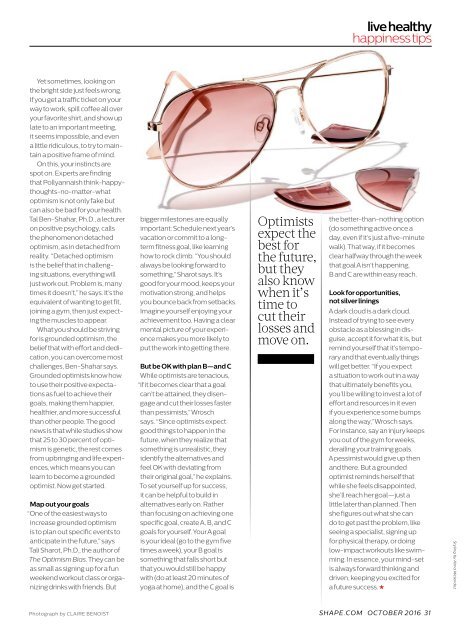SHAPE_OCTOBER_2016
You also want an ePaper? Increase the reach of your titles
YUMPU automatically turns print PDFs into web optimized ePapers that Google loves.
happiness tips<br />
Yet sometimes, looking on<br />
the bright side just feels wrong.<br />
If you get a traffic ticket on your<br />
way to work, spill coffee all over<br />
your favorite shirt, and show up<br />
late to an important meeting,<br />
it seems impossible, and even<br />
a little ridiculous, to try to maintain<br />
a positive frame of mind.<br />
On this, your instincts are<br />
spot on. Experts are finding<br />
that Pollyannaish think-happythoughts-no-matter-what<br />
optimism is not only fake but<br />
can also be bad for your health.<br />
Tal Ben-Shahar, Ph.D., a lecturer<br />
on positive psychology, calls<br />
the phenomenon detached<br />
optimism, as in detached from<br />
reality. “Detached optimism<br />
is the belief that in challenging<br />
situations, everything will<br />
just work out. Problem is, many<br />
times it doesn’t,” he says. It’s the<br />
equivalent of wanting to get fit,<br />
joining a gym, then just expecting<br />
the muscles to appear.<br />
What you should be striving<br />
for is grounded optimism, the<br />
belief that with effort and dedication,<br />
you can overcome most<br />
challenges, Ben-Shahar says.<br />
Grounded optimists know how<br />
to use their positive expectations<br />
as fuel to achieve their<br />
goals, making them happier,<br />
healthier, and more successful<br />
than other people. The good<br />
news is that while studies show<br />
that 25 to 30 percent of optimism<br />
is genetic, the rest comes<br />
from upbringing and life experiences,<br />
which means you can<br />
learn to become a grounded<br />
optimist. Now get started.<br />
Map out your goals<br />
“One of the easiest ways to<br />
increase grounded optimism<br />
is to plan out specific events to<br />
anticipate in the future,” says<br />
Tali Sharot, Ph.D., the author of<br />
The Optimism Bias. They can be<br />
as small as signing up for a fun<br />
weekend workout class or organizing<br />
drinks with friends. But<br />
bigger milestones are equally<br />
important: Schedule next year’s<br />
vacation or commit to a longterm<br />
fitness goal, like learning<br />
how to rock climb. “You should<br />
always be looking forward to<br />
something,” Sharot says. It’s<br />
good for your mood, keeps your<br />
motivation strong, and helps<br />
you bounce back from setbacks.<br />
Imagine yourself enjoying your<br />
achievement too. Having a clear<br />
mental picture of your experience<br />
makes you more likely to<br />
put the work into getting there.<br />
But be OK with plan B—and C<br />
While optimists are tenacious,<br />
“if it becomes clear that a goal<br />
can’t be attained, they disengage<br />
and cut their losses faster<br />
than pessimists,” Wrosch<br />
says. “Since optimists expect<br />
good things to happen in the<br />
future, when they realize that<br />
something is unrealistic, they<br />
identify the alternatives and<br />
feel OK with deviating from<br />
their original goal,” he explains.<br />
To set yourself up for success,<br />
it can be helpful to build in<br />
alternatives early on. Rather<br />
than focusing on achieving one<br />
specific goal, create A, B, and C<br />
goals for yourself. Your A goal<br />
is your ideal (go to the gym five<br />
times a week), your B goal is<br />
something that falls short but<br />
that you would still be happy<br />
with (do at least 20 minutes of<br />
yoga at home), and the C goal is<br />
Optimists<br />
expect the<br />
best for<br />
the future,<br />
but they<br />
also know<br />
when it’s<br />
time to<br />
cut their<br />
losses and<br />
move on.<br />
the better-than-nothing option<br />
(do something active once a<br />
day, even if it’s just a five-minute<br />
walk). That way, if it becomes<br />
clear halfway through the week<br />
that goal A isn’t happening,<br />
B and C are within easy reach.<br />
Look for opportunities,<br />
not silver linings<br />
A dark cloud is a dark cloud.<br />
Instead of trying to see every<br />
obstacle as a blessing in disguise,<br />
accept it for what it is, but<br />
remind yourself that it’s temporary<br />
and that eventually things<br />
will get better. “If you expect<br />
a situation to work out in a way<br />
that ultimately benefits you,<br />
you’ll be willing to invest a lot of<br />
effort and resources in it even<br />
if you experience some bumps<br />
along the way,” Wrosch says.<br />
For instance, say an injury keeps<br />
you out of the gym for weeks,<br />
derailing your training goals.<br />
A pessimist would give up then<br />
and there. But a grounded<br />
optimist reminds herself that<br />
while she feels disappointed,<br />
she’ll reach her goal—just a<br />
little later than planned. Then<br />
she figures out what she can<br />
do to get past the problem, like<br />
seeing a specialist, signing up<br />
for physical therapy, or doing<br />
low-impact workouts like swimming.<br />
In essence, your mind-set<br />
is always forward thinking and<br />
driven, keeping you excited for<br />
a future success.<br />
Styling by Alma Melendez<br />
Photograph by CLAIRE BENOIST<br />
<strong>SHAPE</strong>.COM <strong>OCTOBER</strong> <strong>2016</strong> 31















